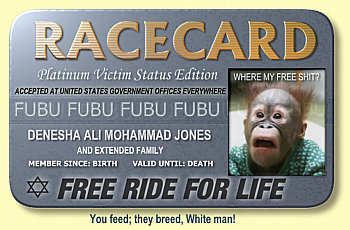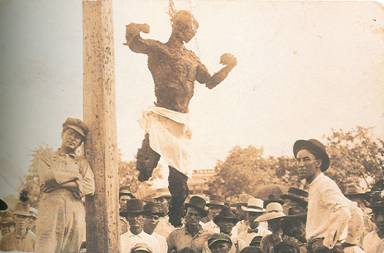
- [A "race card" created as a promotional joke by the white supremacist National Alliance.]
Now we know why Republicans are so blithe about race-baiting from within their ranks: It doesn't really happen, you see.
It's all just in black people's imaginations anyway. It's a fiction created by black politicians for their own gain.
That's the official word from the White House, anyway. Funny how cheap rationalizations created years ago by the National Alliance and David Duke now come out of the mouths of our national leaders.
Most of the country has been watching the story regarding the nasty attack ads against Tennessee Rep. Harold Ford, a black man running for the Senate there. Ford has fired back, and the GOP, after first claiming it could do nothing, has finally pulled the ads. (Josh Marshall has been on the case admirably.)
Nitpicker points out that Tony Snow on Chris Matthews' Hardball show yesterday (video at Think Progress) explained where it's all coming from:
- MATTHEWS: Harold, call me. There's a cute -- I would say sexy, most people would say that -- white woman, naked, naked -- on the screen setting up a date with Harold Ford who is an African-American. In American society -- you went to school in North Carolina. So did I for a year. Do you think in any part of the country that is not playing on racial sensitivities?
SNOW: I don't think so. I mean, maybe I'm just quaint in this day and age. But no, I think there is always an attempt when you have got an African-American candidate to try to attribute something to the race card. But no, I don't.
Snow evidently believes we're all too stupid to read between the ad's lines. (Holding the public and press in general contempt seems to be a requirement for White House spokesmen these days.) Really, it's not hard to understand why Republicans would run an ad depicting Ford dating white women. The South is one of those places where things like interracial marriage and dating still set people off.
(Just in case anyone in fact was too dense to figure it out, the General has a more explicit version.)
Recall, if you will, that the fear of black men having sex with white women was a major raison d'etre of the lynching era:
- Lynchings were broadly viewed as simply a crude, but understandable and even necessary, expression of community will. This was particularly true in the South, where blacks were viewed as symbolic of the region's continuing economic and cultural oppression by the North. As an 1899 editorial in the Newnan, Georgia, Herald and Advertiser explained it: "It would be as easy to check the rise and fall of the ocean’s tide as to stem the wrath of Southern men when the sacredness of our firesides and the virtue of our women are ruthlessly trodden under foot."
Such sexual paranoia was central to the lynching phenomenon. In the years following black emancipation -- during which time a previously tiny class of black criminals became swelled by the ranks of impoverished former slaves -- a vast mythology arose surrounding black men's supposed voracious lust for white women, a legend for which in truth there was scant evidence, and one that stands in stark contrast to (and perhaps has its psychological roots in) the reality of white men’s longtime sexual domination of black women, particularly during the slavery era. In any event, the omnipresence of the threat of rape of white women by black men came to be almost universally believed by American whites. Likewise, conventional wisdom held that lynchings were a natural response to this threat: "The mob stands today as the most potential bulwark between the women of the South and such a carnival of crime as would infuriate the world and precipitate the annihilation of the Negro race," warned John Temple Graves, editor of the Atlanta Constitution. Such views were common not merely in the South, but among Northerners as well. The New York Herald, for instance, lectured its readers: "[T]he difference between bad citizens who believe in lynch law, and good citizens who abhor lynch law, is largely in the fact that the good citizens live where their wives and daughters are perfectly safe."
The cries of rape, for many whites in both South and North, raised fears not merely of sexual violence but of racial mixing, known commonly as "miscegenation," which was specifically outlawed in some 30 states. White supremacy was not only commonplace, it was in fact the dominant worldview of Americans in the 19th and early 20th centuries; most Caucasians believed they represented Nature’s premier creation (having been informed this by a broad range of social scientists of the period, whose views eventually coalesced into the pseudo-science known as eugenics), and that any "dilution" of those strains represented a gross violation of the natural order. Thus it was not surprising that a number of lynching incidents actually resulted from the discovery of consensual relations between a black man and a white woman.
Whites were so proud of their "protective" efforts that they often made postcards from the lynchings. This is what "race card" meant in the old days:

Tennessee, as it happens, has a long and colorful history of lynching. Indeed, the state passed one of the first anti-miscegenation laws in the nation (back in 1822) and was one of the last to repeal them, hanging on until forced to do so by the Supreme Court in 1967.
So perhaps it wasn't just a coincidence that when the Senate last year finally decided to issue an apology for the lynching era, among the six senators who refused to support the measure -- all of whom were Republican -- was the senior senator from Tennessee, Lamar Alexander, who offered as an excuse the following: "There is no resolution of apology that we can pass today that will teach one more child to read, prevent one more case of AIDS, or stop one more violent crime."
Cheap rationalizations, though, have been the GOP's specialty on race relations ever since the advent of the Southern Strategy, and these days are something of an entrenched form of art in conservative circles. Indeed, most conservative rhetoric on race is actually Newspeak: the epistomelogical disembowelment of terms that tend to harm right-wing interests, usually by twisting the meaning to its rough opposite.
Recall, for instance, how "race-baiting" has been distorted into meaninglessness by right-wingers who are prone to engaging in that very behavior (see, e.g., Michelle Malkin). Likewise, identity politics that were created by whites a hundred years ago, under the guise of "eugenics," are now blamed on minorities who are trying to overcome them:
- "Identity politics," though it was not called that then, was an invention of 19th-century white supremacists who, along with their acolytes, continued to employ such divisions with abandon through most of the first half of the last century. Their heirs continue to do so, but in less nakedly racial terms.
Now we have attacks on affirmative action, the "welfare state," hate-crimes legislation, and various aspects of civil-rights law, all under the umbrella of combating "identity politics." And consistently, there has been one primary source for this resurgence of white supremacy camouflaged as "normal" politics: the conservative movement generally, and the Republican Party specifically.
Snow's use of the term "race card" is part and parcel of a general distortion of the term's original meaning, which (like "race baiting") was as a way to describe the racial fear-mongering by right-wing demagogues of the Civil Rights era: someone was playing "the race card" if they tried connecting their opponent to negative racial stereotypes. As a result of right-wing pushback, the meaning has shifted. Nowadays, anyone raising awareness of such tactics -- which is their actual antithesis -- is himself accused of playing the "race card."
Even if Snow's theory -- that it's all coming from cynical black politicians -- were true, it still wouldn't explain why so many Republicans seem to play the race card themselves with nary a black politician in sight.
Actually, it is this serial obfuscation through Newspeak that enables the GOP to get away with waving the Confederate flag and building campaigns around appeals to white people's fears about Latino immigrants. It's how someone like Rush Limbaugh can play the race card as a football commentator -- in an incident that would have destroyed most people's media credibility forever -- and then turn around and claim that it's the people attacking the Ford smear who are actually the racists in all this.
The only effective bulwark against this kind of Newspeak assault on the meaning of important issues in our public discourse is public repudiation, early and often. The point of doing so is not merely for partisan political gain; it's a matter of defending the underpinnings of democracy itself.
This is the conclusion of Tali Mendelberg, whose excellent study, The Race Card: Campaign Strategy, Implicit Messages, and the Norm of Equality, looks at the role this kind of race-baiting has played in the body politic:
- The most important and underplayed lesson of the [Willie] Horton message is that, in a racially divided society that aspires to equality, the injection of race into campaigns poses a great danger to democratic politics -- so long as the injection of race takes place under cover. When a society has repudiated racism, yet racial conflict persists, candidates can win by playing the race card only through implicit racial appeals. The implicit nature of these appeals allows them to prime racial stereotypes, fears, and resentments while appearing not to do so. When an implicit appeal is rendered explicit -- when other elites bring the racial meaning of the appeal to voters' attention -- it appears to violate the norm of racial equality. It then loses its ability to prime white voters' racial predispositions. As a consequence, voters not only become more disaffected with the candidate, but also prevent their negative racial predispositions from influencing their opinion on issues of race. Political communication that derogates African Americans does little harm if it is widely, immediately, and strongly denounced. In an age of equality, what damages racial equality is the failure to notice the racial meaning of political communication, not the racial meaning itself.
It's rather telling, in fact, when our national leaders deliberately choose not to notice the racial meaning of political communications. It reveals, once again, what kind of values the conservative movement is all about.
No comments:
Post a Comment